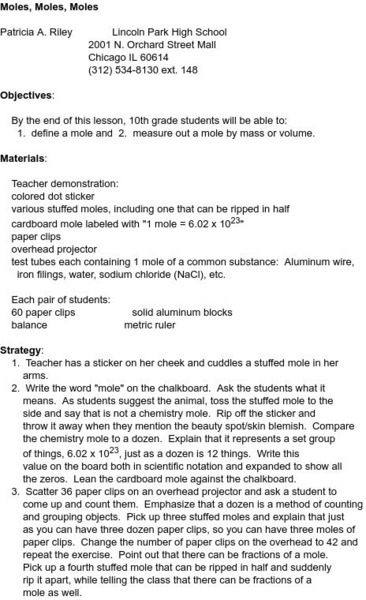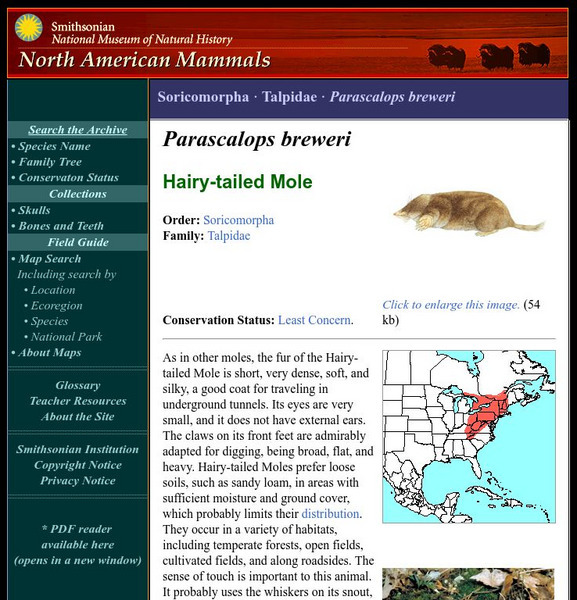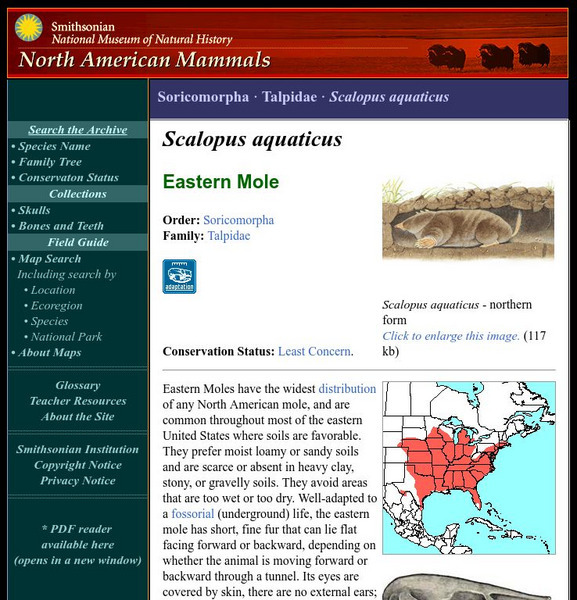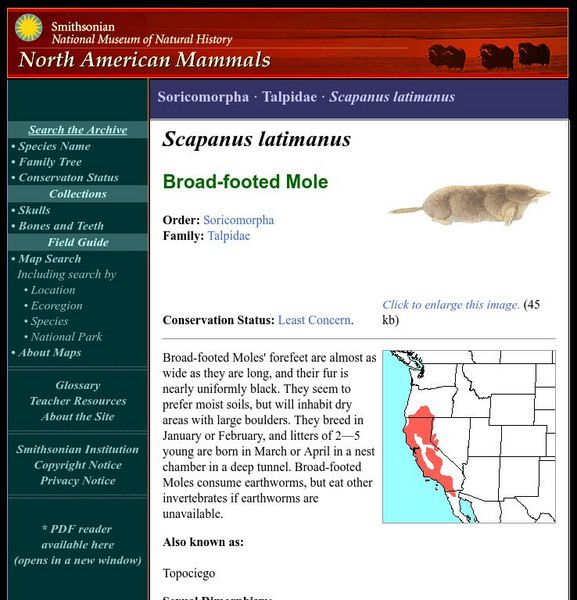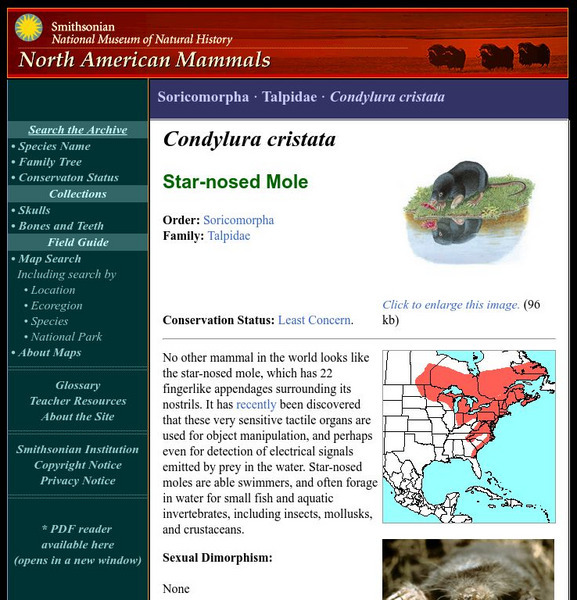BBC
Bbc: Nature Wildfacts: Naked Mole Rat
This resource provides information about the naked mole rat.
State University of New York
State University of New York: Compounds, Molecules, and the Mole
This simulation explores the relationship between mass, moles, molecules and atoms. Select one of the 6 compounds, set the mass of the compound, and release the scrollbar to calculate.
CK-12 Foundation
Ck 12: Plix Series: Gas Density: Mass, Volume and the Mole
[Free Registration/Login Required] Find out what mathematical function should be performed in order to move from mass to moles and back again. After the activity, answer one multiple choice, challenge question about the topic.
Crescent Public Schools
The Internet Science Room: The Mole Concept
Students explore the concept of a mole and molar mass, and how these values are used in chemistry.
ICT Games
Ict Games: Whack a Mole
Students practice number identification and counting forwards and backwards by whacking the mole with the right number.
Science and Mathematics Initiative for Learning Enhancement (SMILE)
Smile: Moles, Moles, Moles
This is an activity that is designed to introduce young scholars to the concept of the mole.
Other
Celebrate Mole Day at 6:02 on October 23 !!!
A page describing how Mole Day is celebrated at the Massachusetts Academy for Mathematics and Science. Some ideas for celebrations can be found here.
Smithsonian Institution
National Museum of Natural History: American Mammals: Coast Mole
Coast Moles are difficult to distinguish from Townsend's Moles where their ranges overlap in the Pacific Northwest. Both have velvety, dark-gray fur and tiny eyes and ears that are hidden under their fur. Learn more about the Scapanus...
Smithsonian Institution
National Museum of Natural History: American Mammals: Townsend's Mole
The largest moles in North America, weighing in at 100 - 171 grams, Townsend's Moles live only in the lowlands on the western side of the Cascade Mountains, from northwestern California to extreme southwestern British Columbia. One...
Smithsonian Institution
National Museum of Natural History: American Mammals: Hairy Tailed Mole
As in other moles, the fur of the Hairy-tailed Mole is short, very dense, soft, and silky, a good coat for traveling in underground tunnels. Its eyes are very small, and it does not have external ears. Learn more about the Parascalops...
Smithsonian Institution
National Museum of Natural History: American Mammals: Eastern Mole
Eastern Moles have the widest distribution of any North American mole and are common throughout most of the eastern United States where soils are favorable. They prefer moist loamy or sandy soils and are scarce or absent in heavy clay,...
Smithsonian Institution
National Museum of Natural History: American Mammals: Broad Footed Mole
Broad-footed Moles' forefeet are almost as wide as they are long, and their fur is nearly uniformly black. They seem to prefer moist soils, but will inhabit dry areas with large boulders. Learn more about the Scapanus latimanus, more...
Smithsonian Institution
National Museum of Natural History: American Mammals: Star Nosed Mole
No other mammal in the world looks like the star-nosed mole, which has 22 fingerlike appendages surrounding its nostrils. It has recently been discovered that these very sensitive tactile organs are used for object manipulation, and...
Encyclopedia of Life
Encyclopedia of Life: Star Nosed Mole
The Encyclopedia of Life presents this in-depth overview of Star-nosed Moles (Condylura cristata), including their habitats, size, conservation status, and much more. Images of this species and maps of its global distribution can also be...
Encyclopedia of Life
Encyclopedia of Life: Eastern Mole
The Encyclopedia of Life presents this in-depth overview of Eastern Moles (Scalopus aquaticus), including their habitats, size, conservation status, and much more. Images of this species and maps of its global distribution can also be...
Upper Canada District School Board
Tom Stretton's Chemistry Pages: The Mole Concept
Deepen your understanding of the mole in chemistry. Find out the origin of the term, and the formulas it represents.
Text Project
Text Project: Fyi for Kids: Vol. 3, Issue 4: Moles [Pdf]
This magazine article is about moles; it discusses how they dig underground, what they look like, and what they eat. It also explains that they help the farmer even though many people consider them a pest because they tear up the lawn.
Sophia Learning
Sophia: Mole as a Quantity: Lesson 2
This lesson will define a mole as a number and a unit (similar to a dozen). It is 2 of 2 in the series titled "Mole as a Quantity."
Chicago Zoological Society
Chicago Zoological Society: Zoo Explorer: Naked Mole Rat
Get acquainted with the naked mole-rat by browsing this brief overview from the Brookfield Zoo. This animal guide includes quick facts and information on its habitat, appearance, social skills, and breeding habits.
Sophia Learning
Sophia: Converting From Moles to Particles: Lesson 2
This lesson demonstrates how to convert from moles to particles (molecules, atoms, ion). It is 2 of 2 in the series titled "Converting from Moles to Particles."
Utah Education Network
Uen: Don't Marry the Mole!
Activities will demonstrate the power of solar energy.
TED Talks
Ted: Ted Ed: Are Naked Mole Rats the Strangest Mammals?
Thomas Park explains how mole rats' peculiar traits have evolved over millions of years to make them uniquely suited to survive harsh conditions- especially long periods without oxygen.
Simon Fraser University
Chem1 Virtual Textbook: Mixtures of Gases
The General Chemistry Virtual Textbook, or Chem 1, is broken into several sections covering various aspects of topics related to chemistry. This section deals with gases and specifically mole fractions and volumes.
Chem Tutor
Chem Tutor: Basic Stiochiometry
Detailed discussion of stoichiometry, mols, and percents. Includes examples showing dimensional analysis (factor-lable method) and a link to the mole road map (a diagram which leads one through the stoichiometric problem-solving process).
Other popular searches
- Molecules
- Molecular Biology
- Atoms and Molecules
- Mole Concept
- Molecular Geometry
- Gumdrop Atoms and Molecules
- Atoms & Molecules
- Compounds and Molecules
- Water Molecules
- Organic Molecules
- Kinetic Molecular Theory
- Atoms Molecules






